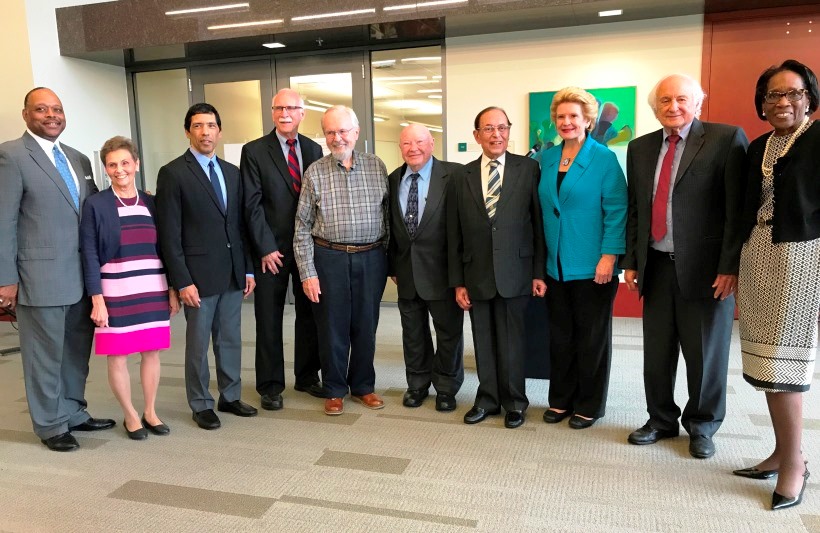
Family, friends and colleagues of longtime Wayne State University School of Medicine faculty member Ananda Prasad, M.D., Ph.D., and wife Aryabala Prasad, M.D., gathered Aug. 29 in the Vera P. Shiffman Medical Library to celebrate the opening of the Ananda S. Prasad, M.D., Ph.D., and Aryabala Prasad, M.D., Collaboration Research Room.
Dr. Prasad, who joined the School of Medicine in 1963, is a distinguished professor of Internal Medicine and a pioneering researcher in the importance of zinc in the human diet. A native of India, he has made important strides researching the mineral, as well as contributing significantly to the field of hematology and sickle cell disease.
The Prasad Room, formerly an underused copier room, highlights his life's work. The Prasads supported the space's renovation through a gift to the university, enabling and inspiring collaborative study and research among students, faculty and the community.
Dr. Prasad's work with zinc began when one of his former professors received an invitation from the Shah of Iran to establish a medical curriculum at the University of Shiraz Medical School and invited Dr. Prasad to accompany him. Two weeks after his arrival, a 21-year-old man who looked like an 8-year-old boy came to Dr. Prasad. The patient lacked secondary male characteristics, was considered mentally lethargic and ate clay. Dr. Prasad diagnosed the man's condition as extreme anemia, but couldn't understand how such a condition came about because most males do not develop anemia without bleeding.
The condition was so prevalent in Iran that it was considered epidemic. Dr. Prasad studied the condition and hypothesized that because plants do not grow without sufficient zinc, perhaps people do not either.
"No one I know has combined such good science with such an impact on community health," said speaker and friend George Brewer, a retired professor of genetics at the University of Michigan who collaborated with Dr. Prasad at a WSU-funded Sickle Cell Center through the mid-1980s.
In the developed world, zinc abounds in a variety of food sources, such as fresh fish, red meat, oysters and dairy products. In developing countries, diets primarily consist of breads and grains, which contain phytate, a substance that binds zinc and iron and prevents both minerals from being absorbed by the human body.
In 1961, Dr. Prasad published an article in the American Journal of Medicine suggesting for the first time that zinc deficiency could account for human growth retardation. In a subsequent paper based on studies done in similar patients from Egypt, Dr. Prasad established that the study subjects suffered zinc deficiency. That study, published in The Journal of Laboratory and Clinical Medicine in 1963, was republished in 1990 as a landmark article by the same journal.
After the publication of these papers, Dr. Prasad started administering zinc through clinical trials, and his subjects began growing taller and developing male characteristics. In 1975, he suggested the National Research Council set the Recommended Daily Allowance for zinc at 15 milligrams per day.
Since then, Dr. Prasad has continued to study the role zinc plays in human development. "I've never left research for one day. And I'm still doing it today," he said.
His zinc studies have saved countless lives in African and Asian countries, including India, Pakistan and Bangladesh. In these areas, the mortality rate from infantile diarrhea approached 85 percent. When the United Nations Educational, Scientific and Cultural Organization adopted zinc supplements to combat infant diarrhea in these regions, that mortality rate dropped to 15 percent.
United States Sen. Debbie Stabenow (D-MI) was among the event's featured speakers, sharing the aforementioned fact, and more.
"Dr. Prasad's generosity will mean that others will continue their work to save and to improve lives, because I know that's what motivates them the most," Sen. Stabenow said. "To my friends, I want to thank you for all of the important work you have done. I want to congratulate you on this incredible honor, and to Wayne State, for making the Prasad Room happen."
U.S. Rep. Sander Levin (D-MI) also attended and spoke at Tuesday's celebration.
"I think you inspire us to continue our work and the work of the United States. Your life's work has meant so much. Although few will ever know, those who do know will have eternal gratitude," Rep. Levin said.
In December 2009, TIME magazine named zinc the "miracle mineral." Dr. Prasad received a congressional commendation for his lifelong studies involving zinc in 2011.